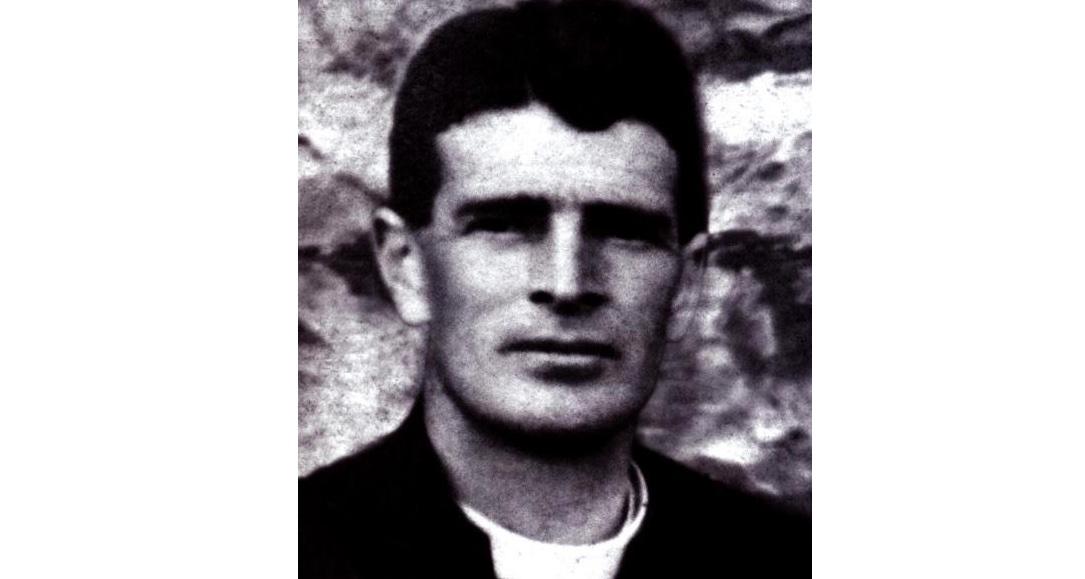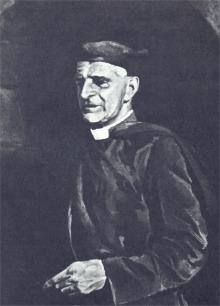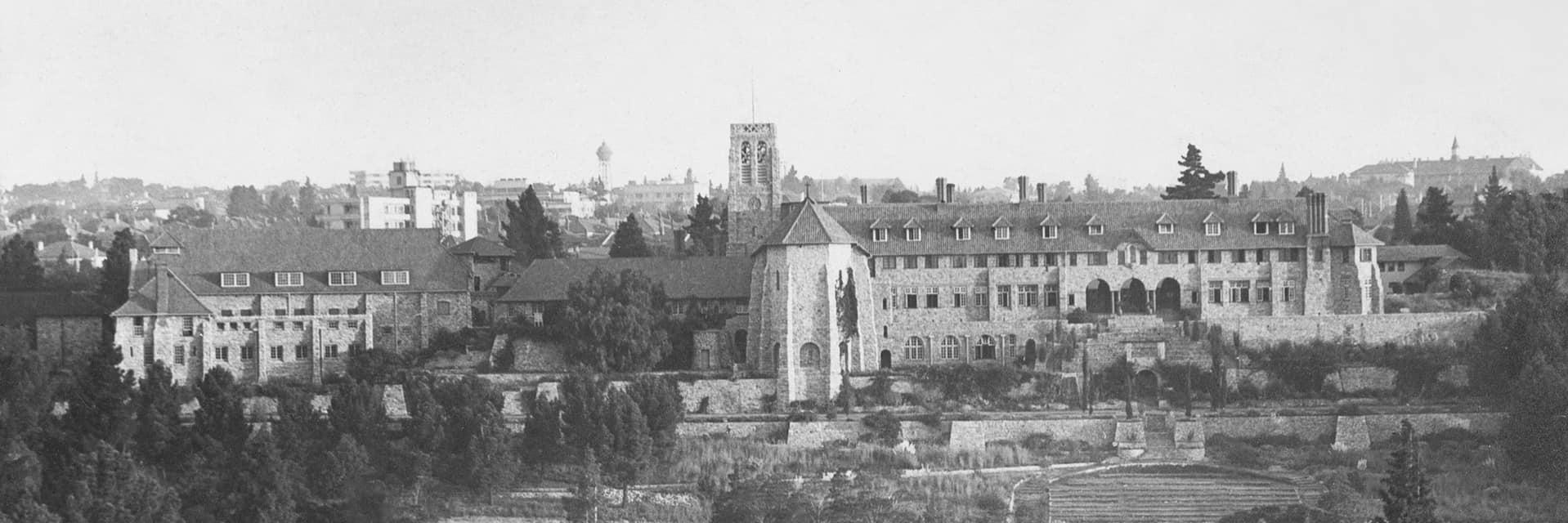
Disclaimer: Any views expressed by individuals and organisations are their own and do not in any way represent the views of The Heritage Portal. If you find any mistakes or historical inaccuracies, please contact the editor.
One of the significant treasures of the St John’s College archives is the handwritten journal of the Boer War by a young chaplain relating his day-to-day war experiences and his description of campaign details as seen from the British viewpoint. This journal has been consulted extensively by academics as well as military history buffs to produce theses and articles of the South African War.
Later much was written about this warrior/priest regarding his bravery as a chaplain in the trenches of World War I and also about his strong views held, often contra conventional opinions of the day. His caring for the common soldier and an absence of self-regard impressed many and engendered numerous anecdotes.
Father Eustace Hill painted by Hugh Dent (Wikipedia)
A revered headmaster for only nine years, some of Fr Hill’s achievements were the creation of many beautiful buildings of the College, the swelling pupil numbers, and sporting achievements, as well as the blossoming of the cadet efficiency platoon. What is less mentioned is the fact that St John’s involvement with the CR Anglican Sophiatown mission came into existence by his urging and under his leadership.
St John's College around the time Fr Hill was headmaster
An early intimation of his morality is found during his first appointment in Johannesburg, before he joined the Community of the Resurrection. During this period Fr Hill worked tirelessly in the SA Church Railway Mission, organising the establishment of African churches and agitating for the improvement of living conditions for the African miners.
Whilst the Boer War Diary of Fr Hill has been dissected at length, there is a hidden part of this journal that is appended at the end, namely his description of the Bambatha Rebellion of 1906. In all the articles, biographies or any mention of Father Hill’s life, this tiny war experience is merely referred to as him participating. Sometimes it is mentioned that he had returned his campaign medals in protest to the conduct of the colonial forces towards the Zulus.
However, in the short but illuminating biography by Dom Michael Hanbury, O.S.B of Fr Hill, who later became Brother James, an Oblate monk, mention is made of Hill’s strong sense of justice and a short summary appears of his participation in this dark event of South African history. Hill’s clash with the British/colonial military command’s violation of human rights and his horror of genocidal war practices is recorded by Dom Hanbury. Hill tirelessly worked to return the young Zulu boys taken by the colonial forces as servants, and when accosted by an officer saying that it was no business of his attending to them and that besides the train was full, Hill said that it was his business and he jumped on the train as it was moving off. He eventually saw that every child was returned in the end. The Zulus gave him a name, meaning ‘The man whose face has looked on God’.
I thought it best for some of Fr Hill’s own words about this appalling military event to be recorded as written by him nearly 118 years ago.
This part of his journal is entitled: Zululand - 1906 punitive expedition against Zulus for resisting a poll tax.
Hill commences his account that he had written to the ‘Leader’ condemning South Africa’s action against the Zulus, but that he had received no support. 'Christians were ignorant of causes and took this line from war makers and money wanters.' (sic)
Fr Hill left Johannesburg in early June and characteristically commented on the ‘lovely country’ as he travelled by train down to Gingindlovu. As in his Boer War Diary, Hill often enthuses about the wild South African landscape, and he often found a suitable treed sanctuary and a suitable rock as an altar for his al fresco communion services.
Ever perceptive, he sums up the situation on the ground, referring to panic behaviour being propagated enough to ‘recruit thousands for an unnecessary war’.
On June 10 Hill hears of an Impi surrounded in Mome Gorge ‘and killed all’. On Monday the 2nd of July, Hill and the Transvaal Mounted commando are ambushed by some Zulus and in the ensuing scrap some soldiers are wounded, one killed. However, the Transvaal Mounted Rifles fought back and bayoneted or shot all the Zulus, ‘and no quarter’ (sic).
'I covered the slain with bushes. I saw many had Bibles but none belonged to any European Mission’. Hill continues: ‘C A Barker asked me if I wasn’t going to congratulate him and I said “No” as I felt disgusted at no quarter orders from McKenzie being carried out, especially in the case of one who was taken prisoner, questioned, and after refusing any information, was taken past me and then, to my horror, shot.'
The final passages from the Journal, written by Fr Hill: (Archivist’s note: The obsolete, now deemed offensive nomenclature of a colonial Victorian, is retained for historical authenticity.)
Thursday, 4th July 1906
Saw a (native) woman come into camp, with a white flag, asking for her boy some Transvaal Mounted Rifles had taken. The boy didn’t want to go. I said: Consider
the parents’ wishes, not the child’s.
Friday, 5th July 1906
Saner said native boys came in with joy to be servants. My point is parents’ wishes should be consulted. Two men I hear have got parents’ consent for the child coming.
Saturday, 6th July 1906
Two women came about a boy taken by Transvaal Mounted Rifles. I saw one woman ask Trooper Thunder, Imperial Light Horse and Gunner’s Mate Warren her question. She came to seek her son. I told Jardine a woman had come for her son. He replied “She has been told twice she cannot have him.” Afterwards he said the Magistrate had a record of all births, etc. and would see to boys being properly taken.
Saturday, 7th July 1906
I told Jardine I considered no child should be taken away from a district except on the basis of parents’ leave and Magistrate’s sanction. He said fact of hut being burnt and food looted constituted sufficient excuse for taking child away. I told him Maphumulo was our Magistracy, not Dalton.
Sunday, 8th July 1906
I left the Transvaal Mounted Rifles as I could not agree with taking these children.
Monday, 9th July 1906
Told Bishop regarding taking of picannin.
Wednesday, 11th July 1906
Wrote to Magistrate, Maphumulo regarding law regulating engaging of small native boys. Said I was not satisfied regarding parents’ consent.
Reply from Magistrate, Maphumulo: ”All boys under 15 are brought to this office by their father or guardian who give their consent.” Signed Maxwell, Magistrate, Maphumulo.
Wednesday, 25th July 1906
Wrote to Dr Taylor saying I wanted some information from his mission station and asking for Swetye’s (the native missionary) address.
3rd August 1906
Wrote to the Bishop regarding Dr Taylor not answering and what I wanted.
5th August 1906
Reply from Taylor who had just returned from Esidumbeni.
7th August 1906
Wrote Taylor: “Does M Swetye know of any native women complaining that their young sons went off with the Transvaal Mounted Rifles?”
15th August 1906
Reply from Taylor. Told me of one small boy taken by Transvaal Mounted Rifles to Congella Camp of whom boy’s father told him and said his request for the boy’s release had been refused. Taylor saw Barker and got boy’s release.
12th September 1906
Taylor wrote: “Swetye has sent me the boys’ names as he has been given them by the parents. Any consent that may have been obtained from the parents must have been obtained under compulsion. The parents do not wish these boys to remain in Johannesburg.
Bhensa and Jantshi – sons of Sintwangu Bulose
Upikieti – son of Pasiwe Mbasasela
Mpondobizi – son of Mazita Gcabatye
Magqibagqiba – son of Deliweyu late chief of the amaNyuswa.
18th September 1906
I wrote Taylor. Please satisfy yourself as to the correctness of Swetye’s general statement and also get all details possible, such as dates. I asked him if he could say what squad in the Transvaal Mounted Rifles the man who took them belonged to; it would narrow the search.
The parents should surely make their complaint themselves to the Magistrate, but I am sure it would be wise if you could satisfy yourself personally that their statements were in order, consistent and clear.
I also should say you should back up this complaint to get it well attended to. Maxwell, I hear, is a good fellow and I feel sure will see justice done. I prayed.
28th September 1906 (received 2nd October)
Goodenough wrote:
- Boys taken about July 4th.
- In no case did parents consent, nor do they consent that the boys remain.
- From natives in Transvaal Mounted Rifles camp I learn:
- Cakidi – son of Pasiwe worked for Mr Crewe
- Jantshi – son of Sintwangu worked for Colonel Barker
- Mpondomyizi – son of Mazibu Gcabatye worked for Colonel Barker
- Upikiti – son of Pasiwe worked for Captain Jardine.
- Ubensa – son of Sintwangu worked for the man who had charge of the forage (name unknown).
- Magqibagqiba – son of Deliweyu worked in the camp.
I have verified Swetye’s statements by calling parents of these boys. They say they did not consent and do not consent now that the boys should be away from home. They wish them returned.
4th October 1906
Called on Colonel Barker and asked for and interview and left my ’phone number.
5th October 1906
Wrote to Colonel Barker saying I had received a letter about some young native boys taken by the Transvaal Mounted Rifles, stating that their parents did not consent to their being taken. Would he deal with the matter if I send him the names of the boys?
I understood from Magistrate, Maphumulo that boys under 15 had to be brought to the Magistrate’s office by their parent or guardian who gave their consent before the boys are engaged.
10th October 1906
Called on Colonel Briggs and asked him regarding the taking of Native Boys. Gave him a “copy” of Goodenough’s list of Boys and their masters. Told him about July 6th. Briggs said Magistrate was person from whom enquiry, etc. should come. I told Goodenough about seeing Magistrate at Maphumulo.
13th November 1906
Heard from the Native Commissioner, Native Affairs Department. Called and gave him a copy of Goodenough’s statement.
Archivist: Here the Journal ends abruptly. However, a significant entry with the heading 'Reflections' appears at the end.
Why did the Church make no protest against this expedition???
Purchase and I discussed it and this is what I gathered:
- Natal in financial straits.
- Decide on a Poll Tax
- Natives find suddenly that Hut Tax is increased to a Poll Tax and resent the surprise and in one case refuse violently to pay.
- War propaganda followed.
- Panic created among whites at Eshowe and a mild one in Johannesburg lest houseboys should rise.
- Poll Tax defended
- Compel natives to work on mines to get money to pay tax.
- Poll Tax condemned.
- No fault of natives there was a deficit in Natal
- Natives didn’t benefit by the tax
- Forcing them to work in the dust of dry gold mines is murder.
The war came because some wanted it and no-one could get facts to condemn it. The orders of no quarter were bad for our men.
Is there going to be power to stop another such raid on the defenceless blacks?
Main image: Fr Hill – Image from a school photograph, St John’s College 1911
About Jenni Millward: Previously Archivist and Museum Curator, St John's College, Johannesburg
Sources
- The Personal Diary of Eustace St Clair Hill, THE BOER WAR. 1899 TO 1902
- Articles in the Johannian Magazine: June 1931, p 5; September 1944, p 42; May 1953, p7; March 1985, p137; 1989, p146; 1998, p36.
- Moth Magazine, January 1981: A Remarkable Man
- Dom Michael Hanbury OSB: Brother James, Oblate, OSB. Eustace St Clair Hill, 1873 – 1953. Reprinted from Pax, Summer 1953
- Gibbs, D F: A Chaplain in the Boer War. Military History Journal, Volume 3, No 2. The South African Military History Society
- An authoritative work on the Bambatha Rebellion is by Jeff Guy: Remembering the Rebellion: The Zulu Uprising of 1906. University of Kwa-Zulu Press, 2006.
Comments will load below. If for any reason none appear click here for some troubleshooting tips. If you would like to post a comment and need instructions click here.


